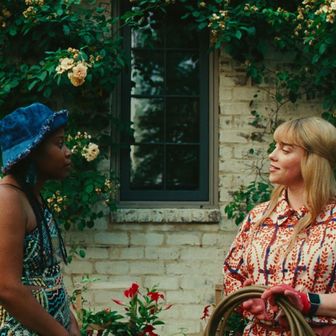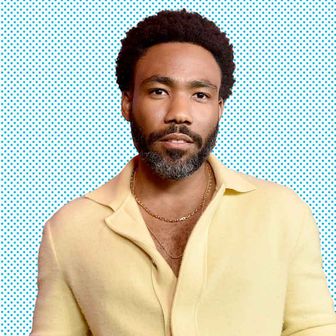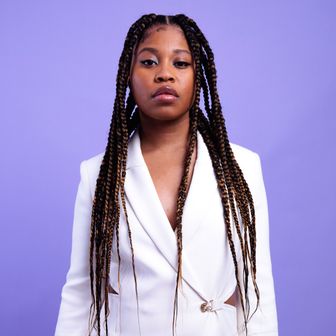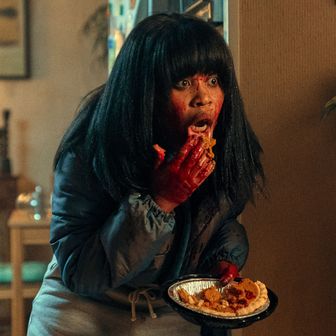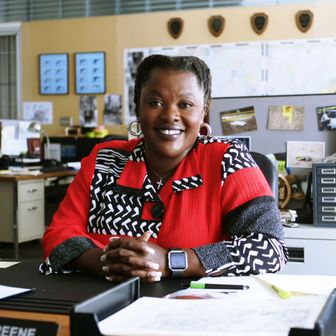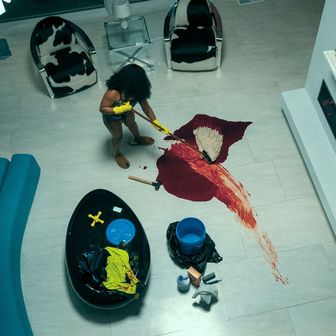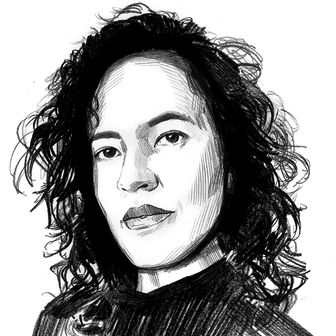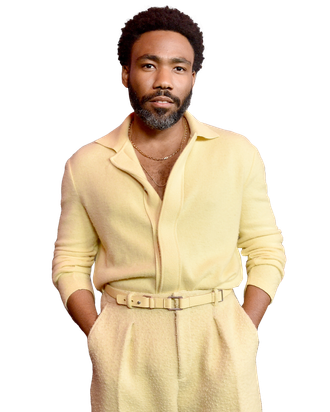
Donald Glover knows what it’s like to be watched — and hated and praised and obsessed over. He knows what it’s like to have a joke or an aside sliced and diced and analyzed, bumped up from throwaway line to grand statement on who you are and what you stand for. He has even seemed to court it, doing things (remember that self-interview?) that wave at the people who think they know him, those who think they could know any celebrity better than that celebrity knows themselves.
You could read all this into Swarm, the series Glover created with Janine Nabers that stars Dominique Fishback as an emotionally wrecked, pop-star-obsessed young woman named Dre. Glover’s previous show, Atlanta, followed a rapper, his manager (played by Glover), and their ecosystem of friends, lovers, and nemeses, with detours into surreal one-off episodes and tons of winky casting and bits. Swarm, by contrast, pretty much just follows Dre — her constant scrolling, her lonely childhood, her blood-splashed vengeance on a world that never had room for her. What seems at first like a comment on deranged fandom starts to feel more like a thesis statement on alienation.
I recently wrote a profile of Fishback and reached out to Glover to hear what it was like to work with her. We ended up talking not only about the part of Dre, but also about cults, shooting on film, and acting — an art he compared to making an “artisanal skillet.”
How did you get the idea to approach Dominique about working on Swarm?
Me and my brother, we were just making a list of people we thought might be good. When Judas and the Black Messiah came out, I remember watching that and being like, “Oh, she’s really good. She seems really warm.” We wanted her to be Marissa, and she was like, “Can I be the crazy one?” And I was like, Oh. The fact that she wanted to do it was a lot of it. It’s probably a fun role to have, but it’s not an easy thing to do.
You asked her to watch The Piano Teacher, the 2001 Michael Haneke movie, before you met. Why?
I was like, “This is what you’re getting into. How does this make you feel? If you’re like, ‘Oh, I don’t want to do it like that’ or ‘I felt like it was too much,’ this probably won’t work.”
A lot of people are very aware of their brand; they’re not trying to become great actors. And in their defense, there’s not a lot of upside to it anymore. It’s like being a craftsman who makes skillets — well, Amazon exists. Why would you spend time on an artisanal skillet? I’m still looking for actors and people who really want to dive in, and I want to try and support those types of people and make a space for them to — I hate the word space, it gets so overused. But I was trying to make a place where she could do whatever she wanted if she wanted to actually act.
Isabelle Huppert in The Piano Teacher was the most interesting character study I’d seen in a minute. Me and my brother were like, “Well, who is that now? Who’s a young version of that? Who’s willing to do that?”
She said it gave her pause, like, Can I really do this?
I’m glad. That was the point. It wasn’t to scare her, but we never wanted to lie about what this was.
There was going to be someone else who would be willing to do this. I don’t know if they’d be able to do as great a job as Dominique did. And I mean that honestly; I’m really glad it was her. But there’s always somebody who’s willing to take the risk. And I’m more interested in the risk. It’s just easy to make shit now. It’s easier to produce it. It’s easier to get the analytics and know what people are going to say and know how people are going to feel. And I am not interested in putting an audience on a slow methadone drip of content. I’m more interested in trying to give someone pause.
Well, this is extremely not a slow methadone drip of content. So basically, once she said she wanted the part, you were like, “Okay, you got it”?
I was pretty confident in her. It was really about like, “Hey, are you willing to work? It’s not going to be easy.” Even on set, it was a lot. She would ask questions and sometimes I’d be like, “Well, if it was me, it would be like that. But I’m a rational person.” She really was lost a lot of the time. And I think she just played her instincts and what was in front of her and what she had to do. And that’s extremely stressful for an actor, especially someone like her, who likes to write down her characters before she does anything.
We specifically didn’t even let her know her own backstory. I felt like if she knew it, she would be telegraphing it unconsciously to the audience. I didn’t want us to understand why Dre was doing this. I didn’t think that would be as much fun as just being this strange being. I wanted her performance to be brutal. It’s just a raw thing. I think actors in general, they want to get layered performances. And I don’t think Dre is that layered. It’s like a dream, these images your brain’s creating. We wanted you to imprint your own idea on it. I kept telling her, “You’re not regular people. You don’t have to find the humanity in your character. That’s the audience’s job.” Because that’s what makes a lot of character studies intriguing: I’m not that person, I’m trying to make sense of them. Dom was purposefully lost for us to get that raw reaction. She’s a special actor. Definitely one of the best I’ve worked with.
Did Dominique make any decisions about the character that surprised you or ended up looking different from what you’d expected?
She grew more and more into it. I kept telling her, “Think of it more like an animal and less like a person.” It reminds me of how I have a fear with dogs because I’m like, You’re not looking at me in the eye; I don’t know what you’re capable of. That’s what I wanted to have with her, and she really nailed that. She just started doing this thing with her eyes where she wasn’t making eye contact with you or would look around.
You do reveal some backstory eventually. We meet her former foster parents and find out how she met Marissa. Did you imagine there being more to it than that?
We talked a lot about mental health and the internet in the writers’ room. We talked about what kinds of personalities are drawn to cults, what kinds of personalities are drawn to obsession, what kinds of personalities are prone to violence. We had people come in who had been in cults or around cults. We asked a lot of questions and made a Pinterest board, if you will, of what could possibly be this character’s deal. But we never answered it. I don’t want people to study this and be like, “Oh, this is a very true depiction of blank.”
What cults had people been in who came to the writers’ room?
It may or not have been … what was it, Nexus?
NXIVM?
Yeah, that one. It wasn’t a former NXIVM person; it was just somebody who was around it.
Did you have anybody involved in stan culture come in to talk?
No, I feel like everybody’s played a part in that on some level. We were talking about how Lil Nas X had a Nicki Minaj stan account before he flipped it to, Okay, I’m making music. He probably liked Nicki Minaj but obviously wasn’t so tied to her. He was like, Oh, I got to get rid of this account. Let me use this. We also thought a lot about how people are used or affected by accounts that might be bots. If somebody’s unhinged and they feel like they’re part of a community, what happens? How is this wiring us?
We have people who are famous in the writers’ room and people you’d barely know. Everybody had a story about how they were roasted. Everyone had the same story of being like, “This person said something, and then some people jumped on the bandwagon, and it affected me.”
You mean getting roasted online?
And it affecting your mental state to the point where you feel like you need to change something.
I want to talk about the episode you directed, the pilot. For the wide shot of her first kill scene, where Dre kills Khalid, you asked them to do it in a single take because of all the blood. What direction did you give them to help pull that off?
Well, there was a lot of tension on set in general because all of the episodes — except the true-crime one — were shot on film, and I’ve never shot on film before. It was actually quite technical because you’re dealing with blood and heavy objects in people’s faces. So I was like, “We’re going to rehearse it a couple of times. After each rehearsal, I’m going to ask how you feel, what’s worrisome to you about it, and how we can maneuver it so that it’s less worrisome.” I felt like the tension really amplified the scene. You can feel it through the lens. It feels intense because it was like, That’s all we get.
Drew Daniels, the cinematographer, did an amazing job. And Damson Idris and Dominique, they were on it. They were not fuckin’ around. After we yelled “Cut!” everybody clapped and we all hugged and everything. And then they were like, “There’s a hair in the gate.” [The gate is part of a film camera close to the lens; a hair would have been visible in the shot.] And I was like, No. It was like someone had shot us. It was just dead silence. And then we checked it and there was a hair, but it was in the bottom left-hand corner so they could edit it out.
Well, using film does make it different. You feel it immediately.
That was a last-minute decision. A couple weeks from shooting, I was like, “If we’re going to do this pulpy thing, I want the tension to be there.” You can do certain things with digital now where it’s not about better or worse, it’s all about aesthetic. And I wanted this show to be Tumblr ready.
I wanna talk about the fantasy element. I watched the Martin Scorsese movie The King of Comedy because I saw that you mentioned it in a few interviews as an inspiration for Swarm. There are a few parallels — like the ending, where you’re not sure whether this is really happening or not.
Bro, we steal everything. Anything that works, we will take it. I’ll leave it at that.
How did you anticipate the audience would react — especially Beyoncé stans?
Man, one thing I’ve learned with the internet is don’t anticipate anything and react to nothing as well. It’s just happening. Trying to anticipate or quell it is like trying to react to the ocean. It’s like if you’re in a riptide, the worst thing you can do is go against the current.
I mean, it might be fun for some of them. There’s no judgment on any of these characters. Although I’m sure, since it’s the internet, some people are going to be like, “He’s saying this.” I just refuse to take that into account because then we wouldn’t be able to make the things we want to make.
I think the advice with a riptide is to not swim against it but to swim sideways.
I’m going to go parallel to the beach and just buy my time.


